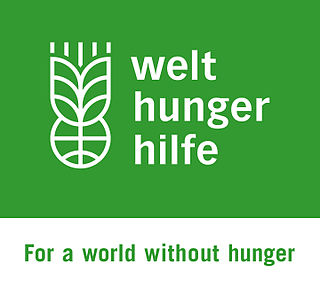
Food is any substance consumed to provide nutritional support for an organism. Food is usually of plant, animal or fungal origin, and contains essential nutrients, such as carbohydrates, fats, proteins, vitamins, or minerals. The substance is ingested by an organism and assimilated by the organism's cells to provide energy, maintain life, or stimulate growth. Different species of animals have different feeding behaviours that satisfy the needs of their unique metabolisms, often evolved to fill a specific ecological niche within specific geographical contexts.

In politics, humanitarian aid, and the social sciences, hunger is defined as a condition in which a person cannot eat sufficient food to meet basic nutritional needs for a sustained period. In the field of hunger relief, the term hunger is used in a sense that goes beyond the common desire for food that all humans experience. The most extreme form of hunger, when malnutrition is widespread, and when people have started dying of starvation through lack of access to sufficient, nutritious food, leads to a declaration of famine.

Food security is the measure of the availability of food and individuals' ability to access it. According to the United Nations' Committee on World Food Security, food security is defined as meaning that all people, at all times, have physical, social, and economic access to sufficient, safe, and nutritious food that meets their food preferences and dietary needs for an active and healthy life. The availability of food irrespective of class, gender or region is another one. There is evidence of food security being a concern many thousands of years ago, with central authorities in ancient China and ancient Egypt being known to release food from storage in times of famine. At the 1974 World Food Conference, the term "food security" was defined with an emphasis on supply; food security is defined as the "availability at all times of adequate, nourishing, diverse, balanced and moderate world food supplies of basic foodstuffs to sustain a steady expansion of food consumption and to offset fluctuations in production and prices". Later definitions added demand and access issues to the definition. The first World Food Summit, held in 1996, stated that food security "exists when all people, at all times, have physical and economic access to sufficient, safe and nutritious food to meet their dietary needs and food preferences for an active and healthy life."

Malnutrition is a condition that results from eating a diet which does not supply a healthy amount of one or more nutrients. This includes diets that have too little nutrients or so many that the diet causes health problems. The nutrients involved can include calories, protein, carbohydrates, fat, vitamins or minerals. A lack of nutrients is called undernutrition or undernourishment while a surplus of nutrients cases overnutrition. Malnutrition is most often used to refer to undernutrition - when an individual is not getting enough calories, protein, or micronutrients. If undernutrition occurs during pregnancy, or before two years of age, it may result in permanent problems with physical and mental development. Extreme undernourishment, known as starvation or chronic hunger, may have symptoms that include: a short height, thin body, very poor energy levels, and swollen legs and abdomen. Those who are malnourished often get infections and are frequently cold. The symptoms of micronutrient deficiencies depend on the micronutrient that is lacking.

CGIAR is a global partnership that unites international organizations engaged in research about food security. CGIAR research aims to reduce rural poverty, increase food security, improve human health and nutrition, and sustainable management of natural resources. It is carried out at 15 centers that collaborate with partners from national and regional research institutes, civil society organizations, academia, development organizations, and the private sector. These research centers are around the globe, with most in the Global South and Vavilov Centers of agricultural crop genetic diversity.

The International Food Policy Research Institute (IFPRI) is an international agricultural research center founded in the early 1970s to improve the understanding of national agricultural and food policies to promote the adoption of innovations in agricultural technology. Additionally, IFPRI was meant to shed more light on the role of agricultural and rural development in the broader development pathway of a country. The mission of IFPRI is to provide research-based policy solutions that sustainably reduce poverty and end hunger and malnutrition.
Nutritional science is the science that studies the physiological process of nutrition, interpreting the nutrients and other substances in food in relation to maintenance, growth, reproduction, health and disease of an organism.

The Global Hunger Index (GHI) is a tool that measures and tracks hunger globally as well as by region and by country. The GHI is calculated annually, and its results appear in a report issued in October each year.
The India State Hunger Index (ISHI) is a tool to calculate hunger and malnutrition at the regional level in India. It is constructed in the same fashion as the Global Hunger Index (GHI) 2008 and was calculated for 17 states in India, covering more than 95 percent of the population.

Despite India's 50% increase in GDP since 2013, more than one third of the world's malnourished children live in India. Among these, half of the children under three years old are underweight.

Food security is defined, according to the World Food Summit of 1996, as existing "when all people at all times have access to sufficient, safe, nutritious food to maintain a healthy and active life". This commonly refers to people having "physical and economic access" to food that meets both their nutritional needs and food preferences. Today, Ethiopia faces high levels of food insecurity, ranking as one of the hungriest countries in the world, with an estimated 5.2 million people needing food assistance in 2010. Ethiopia was ranked 92 in the world in Global Hunger Index 2020.

Deutsche Welthungerhilfe e. V. – or Welthungerhilfe for short – is a German non-denominational and politically independent non-profit and non-governmental aid agency working in the fields of development cooperation and emergency aid. Since its founding in 1962, it has used 3.27 billion euros to carry out more than 8,500 aid projects in 70 countries in Africa, Latin America and Asia.[1]Welthungerhilfe holds the Seal of Approval awarded by Deutsches Zentralinstitut für Soziale Fragen (DZI). In 2014, Welthungerhilfe and the aid organization World Vision International were announced the most transparent German organizations. In 2012, Welthungerhilfe celebrated its 50th anniversary.

Patrick Webb is the Alexander MacFarlane Professor of Nutrition at the Friedman School of Nutrition Science and Policy at Tufts University. He was Dean for Academic Affairs from 2005 to 2014.

Hunger in the United States of America affects millions of Americans, including some who are middle class, or who are in households where all adults are in work. The United States produces far more food than it needs for domestic consumption—hunger within the U.S. is caused by some Americans having insufficient money to buy food for themselves or their families. Additional causes of hunger and food insecurity include neighborhood deprivation and agricultural policy. Hunger is addressed by a mix of public and private food aid provision. Public interventions include changes to agricultural policy, the construction of supermarkets in underserved neighborhoods, investment in transportation infrastructure, and the development of community gardens. Private aid is provided by food pantries, soup kitchens, food banks, and food rescue organizations.
The Feed the Future Initiative (FTF) was launched in 2010 by the United States government and the Obama Administration to address global hunger and food insecurity. According to the National Institute of Food and Agriculture, it is "the U.S. government's global food security initiative."
Prof Lindiwe Sibanda Majele Director and Chair: ARUA Centre of Excellence in Sustainable Food Systems (ARUA-SFS) University of Pretoria South Africa

Food prices refer to the average price level for food across countries, regions and on a global scale. Food prices have an impact on producers and consumers of food.

Sustainable Development Goal 2 aims to achieve "zero hunger". It is one of the 17 Sustainable Development Goals established by the United Nations in 2015. The official wording is: "End hunger, achieve food security and improved nutrition and promote sustainable agriculture". SDG 2 highlights the complex inter-linkages between food security, nutrition, rural transformation and sustainable agriculture. According to the United Nations, there are around 690 million people who are hungry, which accounts for 10 percent of the world population. One in every nine people goes to bed hungry each night, including 20 million people currently at risk of famine in South Sudan, Somalia, Yemen and Nigeria.

Joachim von Braun is a German agricultural scientist and currently director of a department of the Center for Development Research at the University of Bonn and president of the Pontifical Academy of Sciences.














